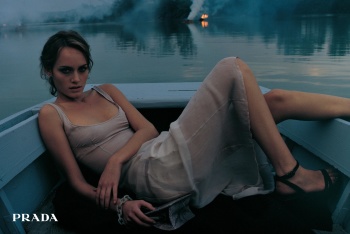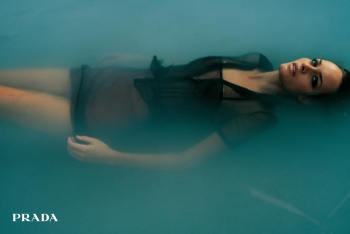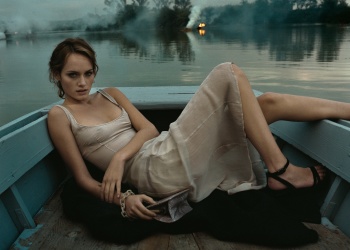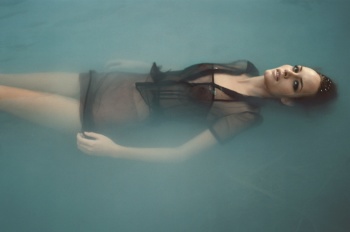
 dja
dja

 vogue.ru
Glen Luchford's best photograph: Amber Valletta modelling Prada in a sinking boat
vogue.ru
Glen Luchford's best photograph: Amber Valletta modelling Prada in a sinking boat
We had to shut the river Tiber in Rome for this picture. It’s expensive to shut down a whole river, but this was for the Prada 1997 autumn/winter campaign, so we had the budget for it. You can’t see them, but there are about 10 people in the water, setting fire to bales of hay covered in kerosene to try and make it look misty. We had to shoot it in the last 10 minutes of daylight, so that the colours would be just right. I wanted it to be more than dusk – you could call it the gloaming.
We’d painted the boat the right colour. Everyone was lined up, ready to go, about four hours before we were due to shoot. But right at the last minute, the stylist decided to change the dress to a red one. That proved too vibrant. Then the boat started to sink and one of the guys throwing the bales of hay in the river forgot to let go and disappeared into the water after it. I’d been planning it for three months but in the last five minutes of daylight, the entire scene descended into utter chaos.
Mr [Patrizio] Bertelli, the boss of Prada, was standing there on the riverbank shouting at everyone. When he asked me if I’d got the shot I said, “No!” and stormed off in a huff.
We went back the next day. We closed the river again and worked on everything we’d done wrong to get it right the second time around. When the film was developed it was exactly what I had wanted to achieve.
I’d seen two films growing up that influenced this shot: one was Andrei Rublev, by Tarkovsky, and Time of the Gypsies by Emir Kusturica. Both have religious scenes of people floating down the river in the mist. I decided to do a homage to both films. I was also thinking a lot about Terrence Malick’s Days of Heaven. (If I were to choose a soundtrack for this shot, it would probably be Soave sia il vento from Così fan tutte.)
Back then, film stock was really oversaturated, because it was developed in the amateur market, so you gotthese bright, vivid colours. I was trying to achieve the opposite – I wanted everything to be underexposed and muted, sombre.
We found tiny lights used for car shots in movies to illuminate people’s faces. We had just one, attached to the side of the boat; that was our only lighting. To get the shot, we had to aim for this one moment when there was a perfect balance between the strength of that artificial light and the strength of the dying sun. Two months later, I discovered Photoshop, with which I could have done the whole thing in just two minutes.
A photo from this shoot ended up on a Giles Deacon dress. The Museum of Modern Art and the V&A had already asked to have the photos in their permanent collections, so they were elevated above just magazine shots.
What you’re looking for, working with anyone from Beyoncé to David Beckham to Björk, is a moment of spontaneity. You don’t want the photograph to feel staged. To do that you have to read each situation.
Over the years you develop a bunch of skills. With this picture, Amber Valletta, the model, had been sitting so still for so long, I think she got a kind of rigor mortis. She was probably also anxiously hoping the boat wasn’t going to fill with water. Looking at some of the things I’ve done, I remember the technical difficulties, the problems. But you create problems to overcome the boredom. Your parameter is basically a girl in a dress, and you do it every day. So you have to find a way to make it more interesting.
theguardian.com


